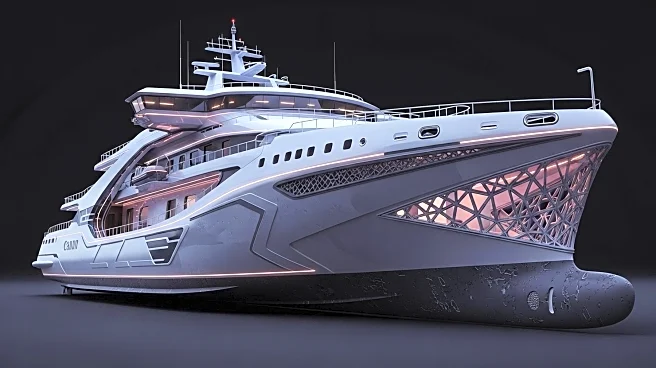What's Happening?
Rapid Fusion, a UK-based specialist in robotic 3D printing systems, is spearheading a £700,000 project aimed at revolutionizing maritime vessel design and production. This initiative, in collaboration with Compute Maritime, seeks to integrate advanced manufacturing techniques to enhance efficiency and sustainability in vessel design. The project is part of a broader trend in industrial design that incorporates technologies like 3D printing and artificial intelligence to reduce costs and accelerate design cycles. The collaboration aims for a 10% reduction in design costs, a 20% faster design cycle, and a 50% increase in overall design efficiency. This development highlights the growing importance of innovative, manufacturable solutions in modern manufacturing.
Why It's Important?
The integration of 3D printing in maritime vessel design represents a significant shift towards more sustainable and efficient manufacturing processes. By reducing costs and speeding up design cycles, this project could set a precedent for other industries to follow, potentially leading to widespread adoption of similar technologies. The emphasis on efficiency and sustainability aligns with global trends in industrial design, where companies are increasingly seeking ways to minimize environmental impact while maximizing productivity. This initiative could also bolster the UK's position as a leader in advanced manufacturing technologies, attracting further investment and innovation in the sector.
What's Next?
As the project progresses, stakeholders in the maritime industry will likely monitor its outcomes closely. Success could lead to broader adoption of 3D printing technologies across various sectors, encouraging further investment in digital manufacturing solutions. Additionally, the project's focus on efficiency and sustainability may inspire similar initiatives in other industries, potentially driving a shift towards greener manufacturing practices. The collaboration between Rapid Fusion and Compute Maritime could also pave the way for future partnerships aimed at enhancing industrial design through technological innovation.
Beyond the Headlines
The project underscores the ethical and environmental considerations in modern manufacturing. By prioritizing sustainability, it addresses the growing demand for eco-friendly production methods. This shift could influence regulatory policies, encouraging industries to adopt greener practices. Furthermore, the emphasis on digital transformation highlights the need for skilled workers in technology-driven manufacturing, potentially impacting educational and training programs to meet industry demands.











